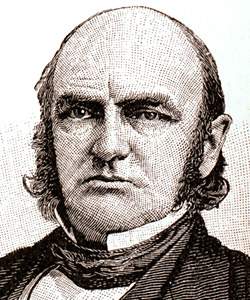Alexander Williams Randall (American National Biography)
Scholarship
Secession and civil war confronted Randall during his second term. After unceremoniously dumping a high-ranking militia officer from the state's only organized regiment for being unenthusiastic about the prospect of confronting Federal authorities in 1860--Wisconsin was challenging the Supreme Court's decision on the state's personal liberty law at the time--Randall became a bulwark of Unionism. In a remarkable reversal, the governor--an ardent supporter of the state's efforts to nullify the Fugitive Slave Law of 1850--declared in his annual legislative message in 1861 that "secession is revolution; revolution is war; [and] war against the Government of the United States is treason" (quoted in Thwaites, p. 44). Randall organized an infantry regiment and made plans for three others immediately after Fort Sumter; he raised fourteen additional regiments, ten artillery batteries, and three cavalry units before leaving office, exceeding Wisconsin's quota by 3,232 men. Randall even sent representatives with his regiments to ensure that Wisconsin's wounded received proper medical attention and free railroad passes home.
Robert W. Burg, "Randall, Alexander Williams," American National Biography Online, February 2000, http://www.anb.org/articles/04/04-00819.html.



